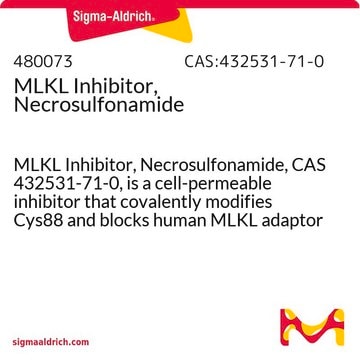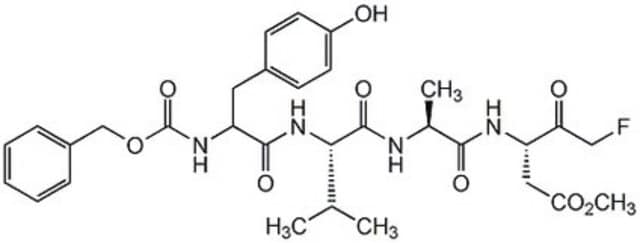V116
Z-VAD-FMK
≥98% (TLC), solid, Caspase inhibitor
Sinónimos:
N-Benzyloxycarbonyl-Val-Ala-Asp(O-Me) fluoromethyl ketone
About This Item
Productos recomendados
product name
Z-VAD-FMK, solid
biological source
synthetic
Quality Level
assay
≥98% (TLC)
form
solid
color
white
solubility
DMSO: 20 mg/mL
H2O: insoluble
storage temp.
−20°C
InChI
1S/C22H30FN3O7/c1-13(2)19(26-22(31)33-12-15-8-6-5-7-9-15)21(30)24-14(3)20(29)25-16(17(27)11-23)10-18(28)32-4/h5-9,13-14,16,19H,10-12H2,1-4H3,(H,24,30)(H,25,29)(H,26,31)/t14-,16-,19-/m0/s1
InChI key
MIFGOLAMNLSLGH-QOKNQOGYSA-N
Gene Information
human ... CASP3(836)
mouse ... CASP3(12367)
rat ... CASP3(25402)
General description
Application
- to induce mixed-lineage kinase domain-like (MLKL) phosphorylation (p-MLKL) in L929 cells
- to induce autophagy in Jurkat and K562 cells
- to revert killing effects of oxaliplatin or oxaliplatin combination with chloroquine (CQ) on HCT116 and SW620 cell lines
- as a caspase inhibitor to inhibit apoptosis and assess nuclear factor-kB, heat shock protein 70 (Hsp 70), proto-oncogene (cmyc) and tumor suppressor protein p53
Biochem/physiol Actions
Features and Benefits
Packaging
Caution
Storage Class
11 - Combustible Solids
wgk_germany
WGK 3
flash_point_f
Not applicable
flash_point_c
Not applicable
ppe
Eyeshields, Gloves, type N95 (US)
Certificados de análisis (COA)
Busque Certificados de análisis (COA) introduciendo el número de lote del producto. Los números de lote se encuentran en la etiqueta del producto después de las palabras «Lot» o «Batch»
¿Ya tiene este producto?
Encuentre la documentación para los productos que ha comprado recientemente en la Biblioteca de documentos.
Los clientes también vieron
Artículos
Cell cycle phases (G1, S, G2, M) regulate cell growth, DNA replication, and division in proliferating cells.
Cell cycle phases (G1, S, G2, M) regulate cell growth, DNA replication, and division in proliferating cells.
Cell cycle phases (G1, S, G2, M) regulate cell growth, DNA replication, and division in proliferating cells.
Cell cycle phases (G1, S, G2, M) regulate cell growth, DNA replication, and division in proliferating cells.
Nuestro equipo de científicos tiene experiencia en todas las áreas de investigación: Ciencias de la vida, Ciencia de los materiales, Síntesis química, Cromatografía, Analítica y muchas otras.
Póngase en contacto con el Servicio técnico















